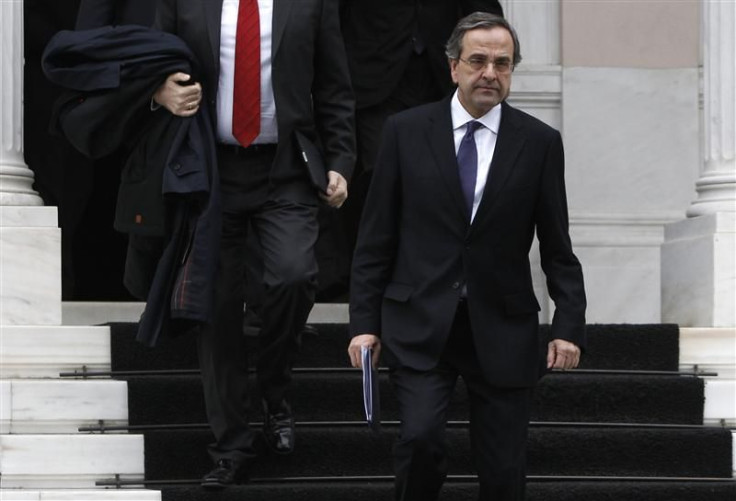Greece: Samaras Fails To Forge Coalition; Bailout At Grave Risk

The political uncertainty in Greece deepened Monday after the head of the conservative New Democracy party, Antonis Samaras, said he failed to attract enough support to form a coalition government after meeting with President Karolos Papoulias.
Samaras’ party “won” Sunday’s election, but with only about 18.9 percent of the total electorate, meaning he had to form an alliance with one or two other parties to create a viable new government.
I tried to find a solution for a government of national salvation, with two aims: for the country to remain in the euro and to change the policy of the bailout by renegotiation, Samaras said in a televised address.
“I did what I could to get a result but it was not possible. As such, I have informed the president of the republic and handed back the mandate.”
He added: “We directed our proposal to all the parties that could have participated in such an effort, but they either directly rejected their participation, or they set as a condition the participation of others who did not accept.
The lack of a coalition government in Athens raises more worries about the country’s bailout agreements with the European Union and International Monetary Fund. Indeed, the only Greek political party that supported the bailout and the subsequent austerity program, the formerly ruling Socialist PASOK, did so poorly in the election that it finished third in the race, with a paltry 13.2 percent performance.
The SYRIZA party, an alliance of leftist groups which vehemently opposes austerity and the bailout, siphoned off enough votes from PASOK to come in second place, with a 16.8 percent tally.
SYRIZA now says it will try to form its own coalition government that will seek to cancel the austerity program and renege on the terms of the bailout. Leader Alexis Tsipras will meet with Papoulias on Tuesday in order to find some kind of compromise.
We will exhaust all possibilities to reach an understanding, primarily with the forces of the left, Tsipras said. There cannot be a government of national salvation, as [Samaras] calls it, since the signatures and his commitments are not salvation, but tragedy for the people and the place.”
In exchange for two huge bailouts totaling 240 billion euros ($310 billion) from the EU-IMF, Athens had agreed to impose massive spending cuts, which included thousands of job cuts in the public sector, salary freezes and reductions and tax hikes.
Only the PASOK party of former Finance Minister Evangelos Venizelos openly supported austerity, while Samaras of ND gave it a lukewarm endorsement. All other political parties (regardless of ideology) rejected austerity and the bailouts.
Meanwhile, under terms of the IMF-EU deal, Greece will have to quickly find another 11 billion euros in spending cuts next month in order to stave off bankruptcy.
The situation in Greece may be described as dire and urgent.
Citigroup has warned that there is now a 75 percent chance of Greece exiting the euro by the end of next year.
Wolfango Piccoli, an analyst at Eurasia Group in London, said in a research note: “Greece is unlikely to have a strong, stable government any time soon, raising political uncertainty and potentially putting its bailout at risk.”
© Copyright IBTimes 2024. All rights reserved.











